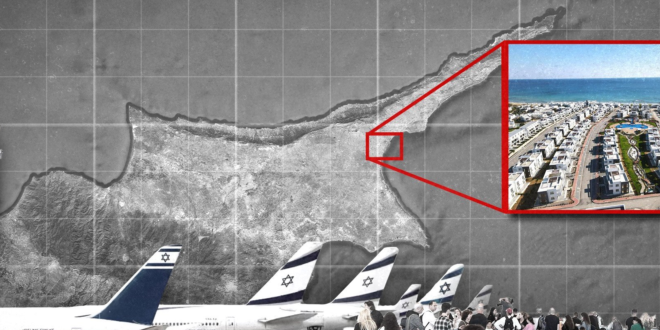Once celebrated as a prime sanctuary for foreign investments in the Mediterranean, Turkish Cyprus has come under fire for allowing Israeli entities to purchase large swathes of property on the strategically significant island.
ter obtained TRNC citizenship, have the right to unlimited property acquisition because they are officially registered as Turkish Cypriot companies.
The companies – Afik Group, Evergreen Developments Group, and Eurocoast Group – have been involved in significant land acquisitions and construction projects, especially in areas facing Israel.
According to Ismail:
These Jewish companies, which acquire thousands of acres of land, are registered as Northern Cyprus companies because they are not perceived as Israeli, making it impossible for the state to determine the actual amount of Israeli purchases.
‘Silent occupation’
Under the country’s laws, foreign companies are limited to acquiring only 500 square meters of land. However, if at least 51 percent of a company’s shares belong to Turkish Cypriot citizens, they are exempt from this limitation, enabling them to acquire larger properties.
This has raised concerns about these citizens potentially being used as fronts or proxies. The Cyprus Foundation issued a public warning regarding the threat posed by Israeli expansion in the region, emphasizing that “Israel’s occupation plan is not limited to Palestine” and that the “promised lands” drawn by the Zionists include not only Palestine but also the island of Cyprus.
The foundation called on the Turkish Cypriot people to put an end to this “silent occupation” and expressed its willingness to cooperate with the governments of Turkiye and Northern Cyprus against this perceived threat.
Some Turkish newspapers have claimed, without citing sources, that 35,000 Jewish people have purchased property in TRNC, amounting to 2,500 hectares of land. Given that Northern Cyprus has a population of only 380,000, officials in Turkiye have suggested that these figures are vastly inflated.
Ersin Tatar, the current head of the TRNC administration, who is recognized as the de facto leader of the Turkish community on the island by western powers, expressed concern over the allegations and stated that his security advisers were investigating the matter.
“We have some steps and measures that will be taken against [these sales],” Tatar said. Currently, foreigners have the right to purchase real estate in Northern Cyprus, including up to five decares (5,000 square meters) of land without a house.
Tatar announced that new restrictions would be put in place in response to the allegations that Israelis and Jewish Europeans were buying up land in the region. “A new regulation will be made regarding this five-decare right,” he said.
In November, Turkish Foreign Minister Hakan Fidan disputed the reports of mass Israeli and Jewish acquisition of property in TRNC during a meeting at Turkiye’s parliament. He stated that only 200 Israeli citizens had made real estate purchase applications in Northern Cyprus since 2000.
“Israeli citizens rank 12th among all countries. In the last five years alone, a total of 15,000 applications for real estate purchases in the TRNC were from other countries, not Israel,” he said.
“England has been in first place since 2000, and Iran has been in first place in the last five years. As you know, real estate sales to third-country citizens in TRNC can be made only through the approval of the council of ministers,” he added, referring to the Northern Cyprus cabinet.
But the government of Turkish President Recep Tayyip Erdogan has come under repeated fire for concealing its surging trade with Israel during the latter’s brutal assault of Gaza. Disclosures about the illicit trade have caused domestic backlashes, which Ankara has been forced to address.
Power struggles in the Med
In parallel with the improving relations between Ankara and Washington, measures to regulate the influx of foreign money into the TRNC’s construction sector have gained momentum. One of the reasons behind the planned legal changes to restrict housing sales to foreigners is the pressure exerted by the US on Turkiye to prevent the circulation of money belonging to sanctioned Russian oligarchs into the TRNC.
The island of Cyprus holds a crucial geo-strategic position in the struggle for hegemony in the Eastern Mediterranean. The US’s efforts to establish a port in the Gaza Strip – allegedly for humanitarian aid activities – and to create a maritime logistics integration bridge between Cyprus and Gaza indicate that the struggle in Cyprus and the Eastern Mediterranean will intensify in the near future.
As many observers note, Washington’s plan is far from benign. Through this, the US aims to control Russia and Iran’s access to the Eastern Mediterranean via the Suez Canal exit.
From a holistic perspective, the current debates surrounding the sale of housing to foreigners in the TRNC and the sanctions being imposed on Russian oligarchs cannot be considered independently of the ongoing struggle for hegemony in the Eastern Mediterranean.
As the struggle for influence in the Eastern Mediterranean continues to unfold, the developments in Northern Cyprus and the actions of various actors, including Turkiye, the US, Russia, and Israel, will play a significant role in shaping the future of the region.
 Eurasia Press & News
Eurasia Press & News



